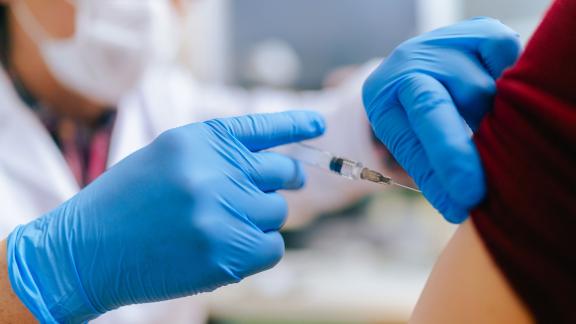Alliance for Better Care: learnings from proactive outreach

Alliance for Better Care shares its key learnings for a vaccination programme that successfully targets underserved groups.
Overview
Since the launch of the national vaccination programme, Alliance for Better Care (ABC) has delivered over one million vaccinations through local vaccination centres, pop-up community clinics and targeted outreach to communities facing the greatest barriers to access.
Key outcomes
- Extensive outreach: More than 6,000 community clinics delivered in diverse, accessible, non-clinical locations.
- Accessible vaccination delivery: 1,000 COVID-19 vaccinations administered outside traditional healthcare environments for cohorts such as the Gypsy, Roma, Traveller (GRT) communities and the homeless population.
- Early identification of long-term conditions: Opportunistic health checks offered beyond the standard NHS Health Check age threshold (40–74), leading to timely referrals for underrepresented groups.
- Stronger community relationships: Increased trust and improved confidence in healthcare services through sustained engagement with community leaders.
- Better local intelligence: More responsive care pathways through direct engagement and co-design with community partners, informed by population health management (PHM) data.
What the organisation faced
Improving access, experience and outcomes for underserved groups is a core organisational priority for Alliance for Better Care (ABC), a GP federation supporting 77 GP practices across Surrey and Sussex.
ABC’s Equity Team is central to removing the physical, cultural, and systemic barriers that prevent underserved groups from accessing care. This multidisciplinary team - comprising nurses, paramedics, a GP clinical lead, a health advocate, and operational staff, includes members with lived experience from the communities they serve, ensuring cultural sensitivity and trust.
The team works with people experiencing homelessness, refugees and asylum seekers, and Gypsy, Roma, and Traveller (GRT) communities.
What the organisation did
Using the Core20PLUS5 framework, population health management (PHM) data and local practice intelligence, the team identified priority populations for outreach. Relationship-building is central: the team first engages with community leaders, builds trust, and then delivers services including:
- mobile clinics in asylum hotels, homeless hostels, and community spaces (including a converted bus)
- planned and opportunistic vaccinations alongside health checks
- GP registration and social referrals to housing, advocacy and support services.
This model ensures every interaction is an opportunity to improve health outcomes, whether by administering a vaccine, initiating treatment or connecting individuals to wider support.
Delivery has ranged from large-scale clinical sites to England’s first GP-federation-led mobile vaccination unit and the south east’s first 24-hour vaccination clinic during the height of the COVID-19 pandemic.
Vaccination sites have included a wide variety of non-clinical and community settings, ensuring both scale and flexibility while providing the dedicated time and personalised support that some individuals require.
Alignment with the NHS England Vaccination Strategy
ABC’s outreach model demonstrates readiness for delegated vaccination delivery in a number of ways:
- Improving access, experience, and outcomes for underserved groups through targeted, flexible, and culturally sensitive delivery.
- Providing healthcare without barriers—bringing services into trusted, accessible spaces.
- Applying evidence-based approaches such as Core20PLUS5 and PHM to target resources effectively.
- Offering a scalable model proven in high-volume pandemic vaccination programmes and adapted for ongoing seasonal campaigns.
- Building sustainable capacity through partnership working, community engagement, and training for wider healthcare teams.
This approach provides a blueprint for inclusive vaccination delivery, combining scale, flexibility and trust to improve uptake, address health inequalities and deliver lasting improvements in community health.
Results and benefits
- More than 6,000 community clinics have been delivered in diverse, accessible, non-clinical locations.
- 1,000 COVID-19 vaccinations have been administered outside traditional healthcare environments for cohorts such as the Gypsy Roma Traveller community and the homeless population.
- Opportunistic health checks offered beyond the standard NHS Health Check age threshold (40–74), has led to timely referrals for underrepresented groups.
- Sustained engagement with community leaders has increased trust and improved confidence in healthcare services.
- Direct engagement and co-design with community partners, informed by population health management (PHM) data, has led to more responsive care pathways.
- 43.87 per cent of participants said that they would not have sought the COVID-19 vaccination through other routes, other than our community pop-ups.
- For vulnerable cohorts such us Gypsy Roma Travellers, the homeless population, refugee and asylum seekers and victims of domestic violence, this statistic was 86.7 per cent.
Key learning
The role of trust
- Vaccine hesitancy is common in inclusion health groups; engagement must start with listening and relationship-building.
- Community representatives should be involved in planning, communication and delivery.
- Opportunistic vaccinations during positive healthcare interactions are more effective than standalone offers.
The importance of continuity
- Trust must be maintained through long-term presence and consistent contact.
- For transient populations, ongoing engagement ensures continuity of care and supports herd immunity.
Local collaboration
- Working through the GP federation enables coordinated outreach across practices, sharing resources and maximising reach.
- Combining PHM data with ‘soft intelligence’ from practice staff ensures unregistered and newly arrived individuals are identified early.
- Co-designing services with communities ensures cultural appropriateness and maximises uptake.
Further information on Alliance for Better Care’s Inclusion Health service:
Alliance for Better Health: Inclusion Health
or email: allianceforbettercare@nhs.net



